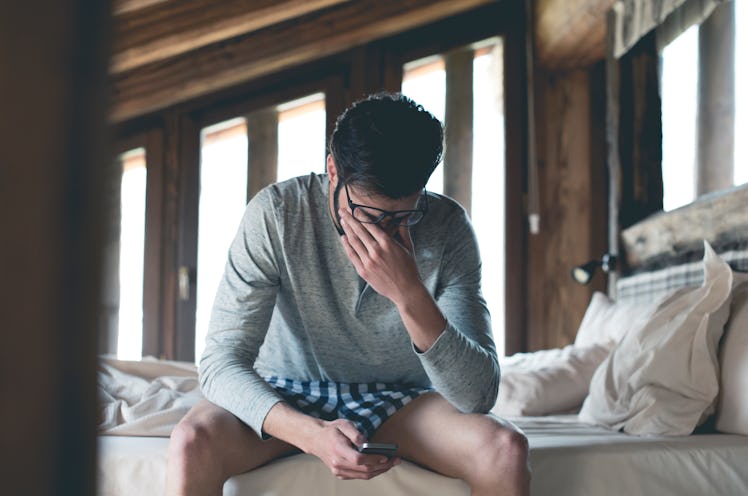What Unemployment Does To A Father’s Mental And Physical Health
Unemployment can literally make men sick, doctors warn.

The shock and subsequent stress of losing a job can feel worse than losing a spouse, research suggests. There’s a battery of physical consequences, too. Getting fired can cause unhealthy weight loss (followed by similarly unhealthy weight gain), acne, high blood pressure, sleep problems, heightened anxiety, paranoia, and depression. Although this is true for both men and women, there’s evidence that fathers are especially vulnerable to the adverse physical and psychological effects following the loss of a job. Simply put, unemployment can make dads sick.
“These cumulative effects are particularly apparent with men because they often see themselves as the breadwinner,” Jarret Patton, M.D., a pediatrician and career coach, told Fatherly. “However, women can have the same physiological and psychological changes.”
The sudden loss of a job typically sends you into fight-or-flight mode, immediately releasing a flood of hormones such as cortisol, norepinephrine, and adrenaline into your system. When you’re running for your life, those hormones are quite helpful. But when you’re an unemployed basket case, those same primal hormones mess with your metabolism and cause the aforementioned stress-related symptoms.
One particularly unfortunate outcome is that more stress means less sleep, less sleep means a poorly functioning immune system, and a shoddy immune system means you’re more likely to get sick. So prolonged stress after losing a job can literally lead to disease — not to mention the psychological symptoms of long-term stress, which include anxiety, depression, and suicidal ideation.
“This is something that I find very common in men who go through sudden job loss,” Patton adds. “I often advise people to seek counseling as a part of their long-term health plan.”
Studies suggest job loss hits men harder than women. A recent review of 4,000 studies on the topic found that British men resume their normal habits about two years after the death of a partner and about four years after a bad divorce. But after losing a job, their well-beings continue to decline as long as they remain unemployed — an effect not seen in women within the sample. Other research suggests that having a spouse and kids provides women a protective buffer for mental health problems when they lose their jobs. Men, however, feel wholly inadequate when out of work.
These unique pressures almost certainly stem from cultural expectations, and these norms are shifting. It’s not unreasonable to suspect that, a few decades from now, the stress responses of unemployed men and women will be roughly the same. But for now, when dad loses his job, he may need a little more TLC.
One way to steel yourself against the adverse effects of job loss is to maintain healthy habits when employed — and stick to them even after you lose your job.
“Offsetting negative changes to your body is essential to your long-term health,” Patton says. “If you aren’t practicing good health habits prior to the job loss, now is the time to start.”
This article was originally published on